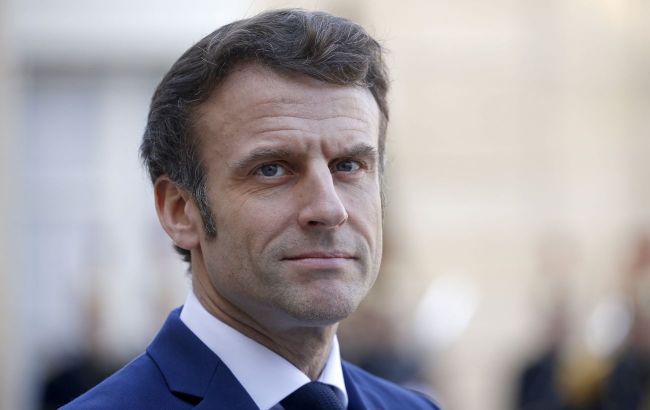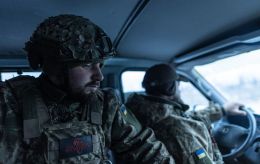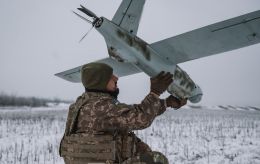Sending troops to Ukraine as hottest issue: Key topics at EU leaders Paris meeting
 French President Emmanuel Macron (Getty Images)
French President Emmanuel Macron (Getty Images)
A meeting of about 20 European leaders was held Monday in Paris, organized by French President Emmanuel Macron to discuss further support for Ukraine. Partners agreed to form a coalition to supply long-range weaponry to Kyiv, while also discussing the possibility of deploying ground troops to Ukraine.
Read about the outcomes of the informal summit in Paris below.
Sources: Le Monde, Reuters, DW, The Guardian, Polskie Radio, Sky News, and Ceske Noviny.
Participants of the meeting, opening, topics
The meeting of European leaders took place on February 26 at the Élysée Palace in Paris. It was attended by German Chancellor Olaf Scholz, Polish President Andrzej Duda, and the prime ministers of about 20 EU countries.
The United States was represented at the meeting by the Assistant Secretary of State for European and Eurasian Affairs James O'Brien, while the United Kingdom was by Foreign Secretary David Cameron.
As announced in Paris, this conference aimed to send a message to Russian President Vladimir Putin about European determination to support Ukraine and refute the Kremlin's narrative that Russia will inevitably win the war, which has been going on for the third year. Therefore, it aimed to discuss further support for Kyiv.
While opening the summit, Macron said that European leaders must prepare for a possible attack by Russia in the coming years.
"The collective analysis is that in a few years, we must prepare for a Russian attack," the French president said.
Therefore, European countries need to make more efforts to provide financial and military assistance to Kyiv, Macron added, saying, "Russia cannot and must not win this war, for the sake of Ukraine itself and the collective security of Europe."
Zelenskyy's speech
President of Ukraine Volodymyr Zelenskyy addressed the participants via video link.
He also underlined Macron's earlier statement that Russia may pose a threat to European countries.
"Together we must ensure that Putin cannot destroy our achievements and cannot expand his aggression to other nations,” Zelenskyy said.
Later, during his traditional evening video address, the Ukrainian leader also mentioned the main topics of the meeting of European leaders in Paris.
"The main theme is everything that strengthens us in Europe, our resilience, capabilities: of course, our arsenals, our ability to produce weapons, supply weapons to Ukraine, and the continuity of support," Zelenskyy said.
Ammunition supply
Macron invited his European colleagues to the Élysée Palace in the first place to discuss how to increase the supply of ammunition to Ukraine amid what his advisors call the escalation of Russian aggression in recent weeks.
He criticized the EU, noting that the promise to deliver 1 million shells to Ukraine by spring "was a reckless commitment by the EU" (the president of Ukraine said that European countries had delivered only 30% of the promised ammunition).
As Le Monde reported, participants expressed support for the Czech initiative to purchase ammunition for Ukraine outside Europe to provide greater support to the Ukrainian army.
At the end of the meeting, Macron personally stated that Western partners intended to consider the possibility of involving third countries in supplying ammunition to Ukraine.
"The supply of ammunition to Ukraine is a priority. We intend to fully utilize our stocks and draw up a list of third countries that could be involved in supplying ammunition," Macron said, also calling on Europeans to "produce more."
Czech Prime Minister Petr Fiala, speaking after the meeting in Paris, said that about 15 countries had shown interest in the initiative, which focuses on the search for urgently needed artillery ammunition for Ukraine on the world markets. But he did not specify which countries he was talking about.
Meanwhile, the Netherlands has already announced the allocation of €100 million for the purchase of ammunition for Kyiv.
Coalition for supplying long-range missiles
France's president also announced that Western partners of Ukraine formed a coalition to supply long-range weapons to Ukraine.
"A new coalition will be created to supply Ukraine with medium and long-range missiles and bombs. We are convinced that defeating Russia is necessary for the security and stability of Europe," Macron said.
According to him, eight coalitions dedicated to supplying specific types of ammunition had been formed before, while the new coalition is the ninth.
Which countries will be part of this coalition is not yet disclosed.
Deployment of troops to Ukraine
The possibility of sending ground troops from Western countries to Ukraine was also discussed at the conference in Paris, Macron said. He noted that "the deployment of Western troops in the future cannot be ruled out," but "today there is no consensus on the official, adopted, and approved dispatch of troops to the region."
At the same time, French Prime Minister Gabriel Attal, following Macron, did not rule out the possibility of sending troops to Ukraine.
In turn, Polish President Andrzej Duda called the discussion on this issue "the hottest."
"The hottest discussion was about sending troops to Ukraine, and once again there was absolutely no agreement," Duda said after the meeting, adding that "there was no enthusiasm for this idea either."
However, Dutch Prime Minister and NATO Secretary-General candidate Mark Rutte told journalists that this issue was not at the epicenter of the negotiations.
The official representative of the White House commented on Reuters' thesis, stating that "the US does not plan to send either its troops or NATO troops to Ukraine."
All these statements were preceded by the words of Slovak Prime Minister Robert Fico, who expressed his opinion on sending soldiers to Ukraine even before his visit to Paris. Here's what he said:
"I can confirm that there are countries that are willing to send their troops to Ukraine, there are countries that say 'never,' including Slovakia, and there are countries that say this proposal needs to be considered."
Fico's words were refuted in Czechia. However, it was before the summit in Paris. Czech Prime Minister Petr Fiala said that his country did not intend to send troops to Ukraine.
The head of the Czech Ministry of Defense, Jana Černochová, also said that she "had not heard anything similar about Fico's words about sending soldiers."
Negotiations with Russia
Austrian Chancellor Karl Nehammer stated, "It is necessary to sit down at the negotiating table with Russia to end the war in Ukraine."
In his opinion, it could involve BRICS: Brazil, India, South Africa, and China.
At the same time, Nehammer said, "Austria has always had a firm position on the conflict, which is that Russia must not win this war."
"If it helps, I would fly to Moscow again," the chancellor said.


